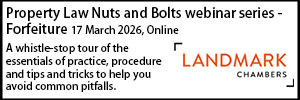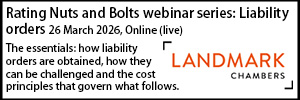Plan Making during COVID–19
- Details
David Manley QC and Piers Riley-Smith analyse publicity and consultation requirements in relation to plan making during the Coronavirus outbreak.
The effects of the COVID-19 pandemic on the planning system has been multi-faceted and wide reaching. It has resulted in a rapid response from lawmakers in the form of the Local Authorities and Police and Crime Panels (Coronavirus) (Flexibility of Local Authority and Police and Crime Panel Meetings) (England and Wales) Regulations 2020 (‘the 2020 Regulations’).
Although useful the 2020 Regulations have provided only broad level assistance on the use of remote hearings. This has left local authorities having to respond rapidly as to how to deal with the application of broad regulations to the various aspects of the planning regime.
In this article we will explore the impact on one particular aspect of the planning regime – the publicity and consultation requirements in plan making – and look at how local Authorities should approach said requirements during the Local and Neighbourhood Plan making process during the COVID-19 outbreak.
Local Plans
The procedural steps and requirements for the making of a Local Plan are primarily set out in the Town and Country Planning (Local Planning) (England) Regulations 2012 (‘the 2012 Regs’). This outlines the multiple stages of publicity and consultation required at the various stages through the Local Plan making process. This includes initial consultation on the options for a Local Plan (Reg 18), the publicity and consultation on a pre-submission draft of the Local Plan (Reg 19), and the publicity and notification of the submission draft of the Local Plan (Reg 20).
Throughout these stages there is a requirement on local authorities to ‘make available’ relevant documents. This is defined at Regulation 35 as being two-fold – both the physical deposit of the relevant documents at the council’s principal office and such other places as the council deems appropriate, and the publishing of documents on the council’s website.
In practice the requirement to make documents available has often been met by the provision of physical documents at public libraries as well as at council offices. However, because of the current restrictions it is no longer feasible to provide documents for public inspection at either of these locations. So how can local authorities continue to meet their publicity and consultation obligations during the lockdown. Can they rely purely on the electronic provision of documents? Could local authorities simply post physical copies to those that require them?
In our view the answer has to be that neither of those ‘solutions’ would be a sensible, fair or lawful response to the current situation. That means until the lockdown is eased the Local Plan processes must be suspended.
Neither Planning Policy Guidance on Local Plans nor the NPPF is of particular use. Instead a great deal of assistance can be found in the Planning Inspectorate’s Procedural Guide for Local Plan Examinations (June 2019 v.5).
This recognises that many of the procedural aspects relating to the progress of an EiP are not dealt with in either legislation or policy guidance. The Guide is therefore recognised as the main source of good practice guidance in respect of many procedural issues. The Guide notes that Inspectors in exercising their function of conducting EiPs are required to “have regard to the spirit of other procedures adopted in the planning system” (Paragraph 4). At the heart of relevant procedures is the aim of achieving fair and proportionate public engagement with the planning process. Paragraph 2.4 of the Guide sees the Examination website as the principal means by which EiP documents can be made available to the public and accessed. However, the document also recognises that not all people have access to the internet and therefore advises that the Programme Officer should arrange for hard copies of documents to be available (see Paragraphs 2.4, 3.23 and 3.24).
This requirement for physical deposit as well as electronic deposit is present throughout the whole of the planning system. This is relevant because of the expectation in the June 2019 Guidance that Inspectors in exercising their powers will have regard to the spirit of other procedures adopted in the planning system. Those procedures tend to recognise that not everybody has access to the internet and that is addressed by the option of physical deposit of relevant documents. It is notable that PINS which is fully alive to the normal procedures adopted in respect of publicity and consultation in respect of documents during the progress of an EiP has not sought to suggest that these normal procedures can be materially changed during the current COVID-19 crisis.
This is in our view correct because it reflects the express wording of Regulation 35 in that the requirement is for both physical and electronic copies to be made available. To do otherwise would give rise to potential legal challenges on a number of grounds. Firstly the practice to provide both physical and electronic copies is enshrined in the 2012 Regs and reflects the wider practice across the planning system. This means that there will be a legitimate expectation that a physical copy will be provided. Secondly, the failure to do so could trigger issues under the Equality Act 2010. Discrimination by reference to age is prohibited and it is a fact that there is less access to the internet among society’s older cohort.
We do not believe that these issues could be resolved by the posting out of hard copies to those who requested them. While this may seem like a pragmatic solution it could lead to more practical difficulties. How many documents would the local authority need to send out? It is often the case that relevant documents for Local Plans refer to other documents in the examination library. It would not be feasible for local authorities to send out at request hard copies of the whole plan examination library. Furthermore to whom should the local authority send out hard copies? While it may be easy to identify certain parties on council databases and contact them offering hard copies (and supplement this with local newspaper adverts) this could still miss out on certain individuals who would then have potentially arguable claims against the local authority.
Overall in relation to the tricky issue of publicity and consultation for the Local Plan making process during the lockdown we feel the only safe option would be to await the easing of social distancing restrictions. To do otherwise would run the risk of challenge.
Neighbourhood Plans
The process for bringing forward a Neighbourhood Plan is primarily set out in Schedule 4B of the Town and Country Planning Act 1990 (‘the 1990 Act’), and Part 5 of the Neighbourhood Planning (General) Regulations 2012 (‘the NP Regs’).
There are two formal stages of consultation and publicity for a Neighbourhood Plan. The first stage is on the pre-submission draft of the Plan (Reg 14). The second stage is on the submitted draft of the Plan (Reg 16).
Both Regulation 14 (a) (ii) and 16(a) (ii) require the plan making body to publicise ‘in a manner likely to bring to the attention’ of people in the neighbourhood both details of the proposal, and details of where and when the Plan may be inspected.
While the NP Regs do not have an equivalent of Regulation 35 in the 2012 Regs we believe there is still a requirement for there to be a provision of a physical copy of the Plan. The terminology ‘when and where’ clearly infers the production of a physical copy at a library or public place only open for certain hours.
Furthermore to argue otherwise would make the Neighbourhood Plan process the exception to the rest of the planning regime that requires both electronic and physical copies.
Because of this all the points made in relation to Local Plans above also apply to Neighbourhood Plans. There is a requirement for physical deposit, which is impossible at the present time. The statutory requirement cannot be met and therefore to consult solely electronically would amount to a breach of statutory duty. That cannot be remedied by posting copies to people who asked for a copy. The duty for physical deposit is a statutory duty and it can only be avoided by emergency legislation overriding the provisions. So far the Government has not seen fit to amend the provisions. It follows that Neighbourhood Plan consultation will have to await the easing of social distancing restrictions.
Conclusion
The planning system is facing unprecedented challenges during the COVID-19 pandemic. It is of course important that, where they can be made, compromises are reached which allows for the continued operation of the planning regime. However, those compromises cannot be made at the price of public participation – a central concept of planning. When it comes to the plan making process the physical provision of documents for inspection is an absolute legal requirement that cannot be watered down or circumvented. For local authorities it must be preferable in the long run to delay now to avoid challenge later.
David Manley QC and Piers Riley-Smith are barristers at Kings Chambers.
Sponsored articles
Walker Morris supports Tower Hamlets Council in first known Remediation Contribution Order application issued by local authority
Unlocking legal talent
Legal Officer
Senior Solicitor - Property
Legal Director - Government and Public Sector
Locums
Poll














































